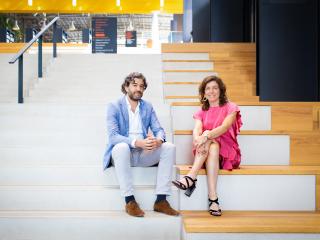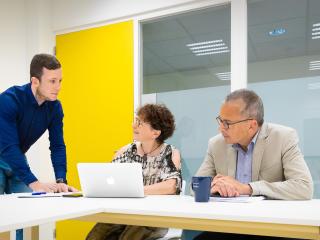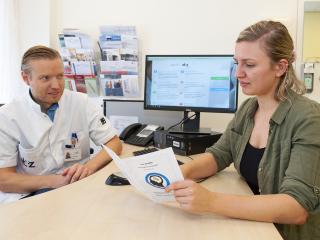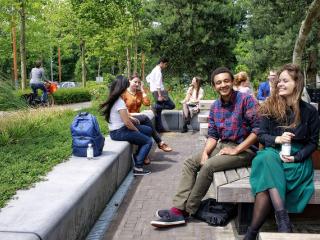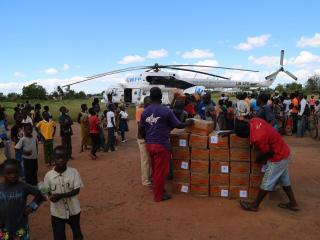Four Departments work together from their own perspectives
How can companies collaborate in the field of logistics and at the same time strengthen each other in other areas? Four Tilburg University Departments from three Schools are jointly researching this within the COMPOSE project. Professor Goos Kant: “Companies are being matched; it's a kind of business Tinder.”
‘Business Tinder COMPOSE Matches Companies’
The employers' association evofenedex and Tilburg University started the research two years ago thanks to an NWO grant. “evofenedex has 15,000 members. Not all of them know each other, let alone that they know what each another's logistical needs and opportunities for collaboration are,” explains Nanne Schriek, project leader Supply Chain Management at evofenedex. “Then it's hard to get collaborations off the ground.”
Online platform
“Companies were reluctant to or did not give it priority,” Kant adds. “That's why we started looking at how we can make collaboration easier. We came up with an online platform on which companies can create a profile. In general, it is clear where there is a match. Then the parties meet to continue talks at a detailed level.” Schriek: “The algorithm also includes the soft side of a match. Previous research has shown that a personal click and a matching company culture are crucial factors for cooperation.”
‘These are big projects, but our members see the advantages.'
- Nanne Schriek
Advantages
What are the benefits of collaboration for companies? Schriek: “Companies save on transport costs. A truck should also be filled on its way back. At the same time, better use of truck capacity results in lower CO2 emissions, which is better for society. And there are also benefits for customers. Suppose a company delivers an order in Bulgaria once every two weeks, while a colleague does the same. By working together, they can supply their Bulgarian customers every week.”
Cooperation in the field of logistics
What is new about the COMPOSE approach is that the facilitation of collaboration is not aimed at transporters but at shippers: producers and wholesalers who want to have goods transported. Within the platform, it concerns transport from and to the Netherlands. Kant: “The bigger the distance, the bigger the advantage. But it is possible to make a difference close by. And, it's more than transport. Suppose that on an industrial estate two companies are active in another season. It would make it easier for them to retain staff by working together.”
Schriek complements, “There are members who are looking for extra storage space for a period of time and are now placing it with a service provider. Maybe that's not necessary if they work together with another company that also offers a seasonal product and, temporarily, has storage space left over”. It can also make a difference within a single company with several factories. In our research, a company with several branches discovered, by filling in the profile, that internal collaboration was possible. “

‘Through interdisciplinary collaboration, you arrive at insights that you wouldn’t have on your own.’ -
- Goos Kant
Multidisciplinary
Four Departments within Tilburg University are involved, namely Social Psychology, TILEC, Supply Chain Management, and Econometrics and Operations Research. Why? Kant: “It's a complex issue. How can companies work well together? Which (international) regulations are facilitating and which are not? How do the companies’ strategies match? And how do you calculate and settle the financial benefit? Everything counts. The great thing is that everyone looks at COMPOSE from their own point of view. The econometricians, for example, had made a wonderful, fair calculation for the distribution of the revenues. This was rejected by the social scientists because it was ‘too complicated, companies don't do that.’ By working together, you include every facet. It leads to insights you just wouldn’t have on your own.”
Building a community
COMPOSE started two years ago. At this moment, the website has been delivered as a “minimum viable product.” Kant: “The more parties participate, the more valuable the site becomes. We need to build a community. Compare it with Marktplaats: the more people use it, the better. Now, our students still help with filling the tool and matching companies. The goal is for companies to do this themselves and for a list of opportunities to emerge.”
Schriek: “In recent years, evofendex has had a stronger focus on Supply Chain Management and therefore on digitalization and collaboration, with which we want to help our members. COMPOSE fits in with this.”
Spot the differences
When companies talk about collaboration, the details are discussed. Kant: “Suppose a flower bulb manufacturer wants to cooperate with a pot supplier. These flower bulbs should be transported refrigerated. They may be on a different size pallet and the companies are spread across the Netherlands. If you focus on the differences, possible collaboration is quickly stopped, while this example turns out to be a very interesting business case. It doesn’t work if you start doing ‘spot the differences.’ You had better look at where you can strengthen each other.” Schriek: “You have to build a lasting relationship together because you know that you are going to run into things that you have to solve jointly. The first companies react enthusiastically. These are big projects, but they see the advantages.”
Contact
More articles Focus on Impact
Date of publication: 17 February 2020



